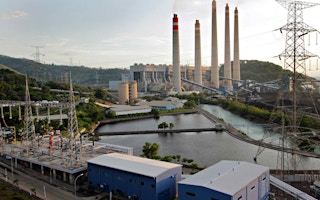Indonesia’s plan to build more than 100 new coal-fired power plants over the next five years could result in the premature deaths of as many as 28,300 people a year, according to new research done by Harvard University and Greenpeace Southeast Asia.
To prevent such unnecessary deaths, the researchers are calling on Indonesia to reduce or even eliminate the use of coal in power generation, which is the biggest source of greenhouse gases in the world.
In a report published on Wednesday, the team at Harvard University’s Atmospheric Chemistry Modeling Group revealed that each year, about 6,500 Indonesians already die from pollution generated by existing coal-fired plants, which fill the air with toxic substances including mercury, lead, arsenic, and cadmium.
The health effects of this pollution ranges from increased risk of chronic diseases such as lung cancer in adults to acute respiratory infection in children, said the team in a report titled “Human Cost of Coal Power”.
And each large new power plant – defined as anything above 1000 MW capacity – could result, on average, in the deaths of 600 more Indonesians every year, the report said.
“Every new coal-fired power plant means elevated health risks for Indonesian people,” said Hindun Mulaika, climate and energy campaigner at Greenpeace Southeast Asia, in a statement.
“Lives are cut short through strokes, heart attacks, lung cancer and other cardiovascular and respiratory diseases. The health impacts sadly also include deaths of many young children.”
Indonesia aims to build 117 new coal-fired power plants over the next five years - adding to the 42 existing plants - under an ambitious plan by President Joko Widodo to add 35,000 megawatts of power to the country before the end of his five-year term in October 2019.
Targeted at boosting the Southeast Asian’s nation economic growth and providing electricity to households in less developed regions, this plan will nearly double the current available production capacity of 40,000 MW and cost hundreds of trillions of rupiah in investment.
About 22,000 MW – or about 63 per cent of the target – will be met by building new coal-fired power plants.
If these – and those currently under construction – are completed, the annual death toll could rise to 28,300 every year, the report said.
Leader in geothermal power
The researchers recommend that Indonesia follows the example of the United States and China in shutting down their coal plants and opting for alternative sources of energy such as geothermal, wind and solar power.
These countries are moving away from the use of coal because of growing concerns over climate change and a historic meeting in Paris at the end of the year to agree on a legally binding pact to reduce carbon emissions.
On Thursday, Kiribati President Anote Tong also called for a global and immediate moratorium on all new coal mines and coal mine expansions, and asked world leaders to back his call for action in lead-up to the Paris climate talks in December.
Kiribati is among the small islands in the Pacific and Indian oceans that are at risk of being extensively or completely submerged if sea levels continue rising at an unmitigated pace, says the Intergovernmental Panel on Climate Change.
Multilateral organisations and sovereign wealth funds such as the World Bank and the Norwegian sovereign fund have also sold or started selling their coal assets, making fund raising for new coal power capacity increasingly difficult, the report added.
This ‘divestment movement’ away from coal, as it is called, continues to gather steam, which may be contributing to research site Coalswarm’s report showing “that two-thirds of coal-fired power plants proposed worldwide since 2010 have been stalled or cancelled”, it said.
The global growth rate in coal-fired generating capacity is slowing, down from 6.9 per cent in 2010 to 2.7 per cent in 2013.
“As such, raising capital for new coal projects will be increasingly difficult and unlikely,” the report said.
A more sensible alternative would be for Indonesia to start investing in its abundant geothermal energy reserves.
With 40 per cent of the world’s geothermal reserves – thanks to its string of volcanoes – Indonesia could lead the world in geothermal energy, it said.
The country’s geothermal capacity exceeds 29,000 MW, but our country has developed less than 4 per cent of that capacity.
Investing in clean energy and eliminating the use of coal in power generation will also help the country reduce greenhouse gas emissions, the report said.
Its policy of coal plant expansion seems to go against its commitment in 2009 to cut emissions by 26 per cent below business-as-usual by 2020.
This goes against the global trend, and the country is “ignoring the health of its own people and breaking its promise to reduce greenhouse gas emissions,” the report said.
“With the global trend of cutting greenhouse gas emissions ahead of a new universal climate change agreement to be adopted in December 2015, it is a time for Indonesia to change its policy and stop promoting coal-fired power plants.”

















